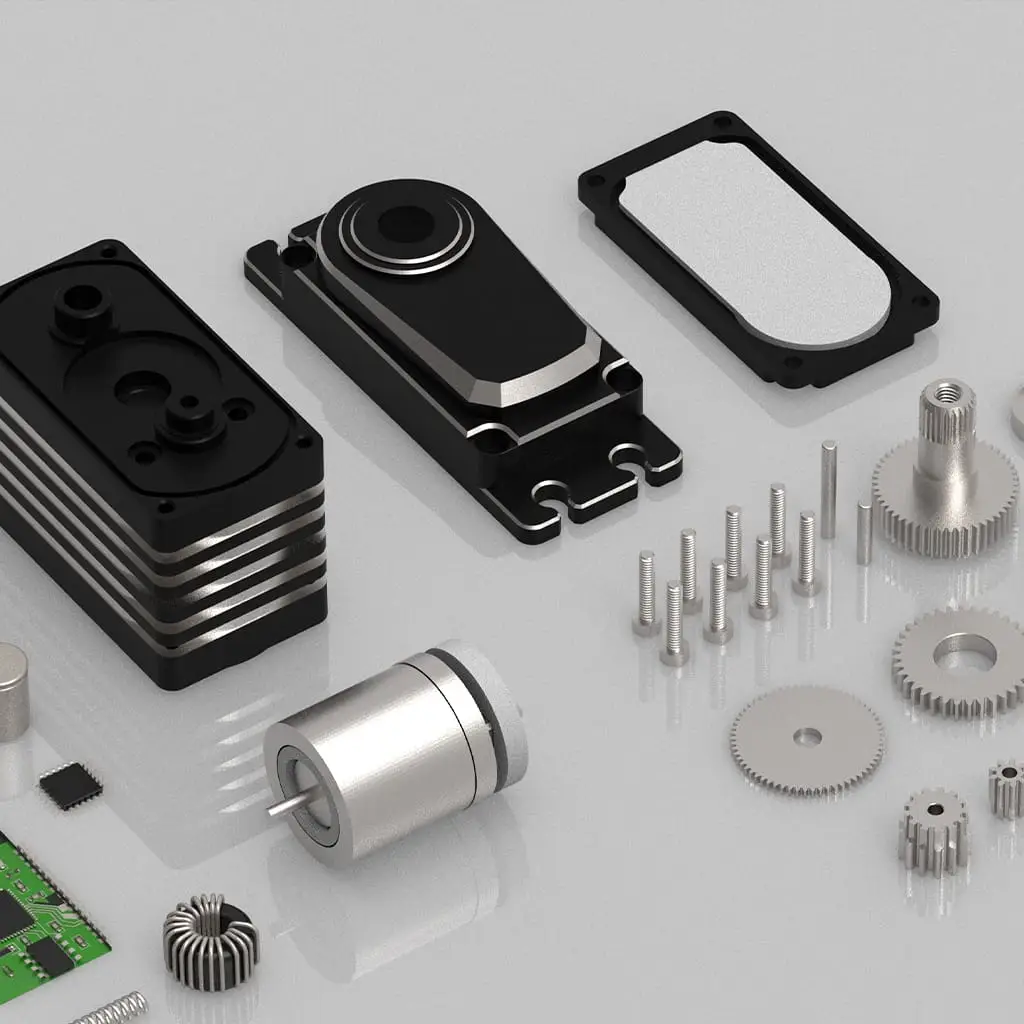In the process of selecting servos, the comparison between metal gears and plastic gears has always been a hot topic among engineers and enthusiasts. As a well-known domestic servo brand, GXServo has excellent performance in both types of gear servo product lines. This article will focus on the technical advantages of metal gear servos and their most suitable application scenarios.
1. Structural Characteristics of Metal Gear Servos
Metal gear servos, as the name suggests, use metal materials (usually steel or brass alloy) for the internal transmission system. GXServo’s metal gear servo product line adopts precision-machined alloy gears paired with high-quality bearings to form a robust and durable power transmission system.
Compared with plastic gears, metal gears have higher material density and strength. Taking GXServo’s classic metal gear servo MG-995 as an example, its gear set undergoes special heat treatment, with surface hardness reaching above HRC45, enabling it to withstand greater torque without deformation.
2. Core Advantages of Metal Gear Servos
- Exceptional Load Capacity
The greatest advantage of metal gears lies in their outstanding compressive strength. Under the same size conditions, the torque that metal gears can transmit is typically 3-5 times that of plastic gears. GXServo’s metal gear servos are particularly suitable for high-torque output applications, such as robotic joint drives and heavy-duty remote-controlled models. - Extended Service Life
The wear resistance of metal materials far exceeds that of plastic. Under normal operating conditions, the lifespan of GXServo metal gear servos can be more than 10 times that of plastic gear servos. This is especially important for professional applications requiring long-term stable operation, such as industrial automation equipment and security surveillance pan-tilt units. - Stable Performance
Metal has a low thermal expansion coefficient, maintaining more stable meshing clearance in varying temperature environments. GXServo ensures that the fit tolerance between gears is controlled within 0.02mm through precision machining, allowing its metal gear servos to maintain precise positioning even in environments with drastic temperature changes. - Strong Impact Resistance
Under sudden loads or accidental collisions, metal gears generally do not suffer catastrophic failure. GXServo’s metal gear servos are particularly suitable for applications such as off-road vehicles and aircraft models that may experience severe vibrations.
3. Application Scenarios for Metal Gear Servos
Based on the above advantages, GXServo metal gear servos perform exceptionally well in the following scenarios:
- Heavy-Duty Robotic Joint Drives
In applications such as humanoid robots and industrial robotic arms that require continuous heavy load-bearing, the durability advantages of metal gears are fully utilized. GXServo’s industrial-grade servo series can meet these high-demand applications. - Professional-Grade Remote-Controlled Models
For large-scale competitive remote-controlled cars (1/8, 1/5 scale) or helicopter main rotor controls, where instantaneous torque requirements are extremely high, metal gear servos are the preferred choice. - Harsh Environment Applications
Outdoor security equipment and agricultural automation machinery may face challenging conditions such as dust, moisture, and large temperature variations. The corrosion resistance and temperature stability of metal gears make them more suitable for such environments. - High-Precision Applications
Although plastic gear servos can also achieve high precision, metal gears maintain their accuracy better over long-term use. Applications such as astronomical telescope positioning and precision instrument adjustments often opt for metal gear servos.
4. Limitations of Metal Gear Servos
Despite their many advantages, metal gear servos also have some inherent limitations:
- Higher Cost
The cost of metal materials and the difficulty of processing result in prices that are typically 1.5-2 times that of comparable plastic gear servos. GXServo has partially mitigated this issue through mass production, but the price gap remains. - Greater Weight
The density of metal is higher than that of plastic, increasing the weight of servos of the same specification by 20%-30%. This factor needs careful consideration for weight-sensitive aircraft models. - Noise Issues
Friction between metal components generates higher noise levels, which may be unsuitable for applications requiring quiet operation. GXServo has reduced but not entirely eliminated this issue through special lubrication processes. - Low-Temperature Brittleness
Certain metals become brittle at extremely low temperatures, requiring specially designed models for applications in polar regions and other unique environments.
5. Technical Features of GXServo Metal Gear Servos
GXServo has several patented technologies in the field of metal gear servos:
- Composite Lubrication System
Combining solid and liquid lubrication to significantly reduce the coefficient of friction between metal components and extend service life. - Modular Gear Set
The core transmission components adopt a modular design, allowing users to replace damaged gears individually, reducing maintenance costs. - Intelligent Overload Protection
Built-in mechanical clutch automatically disengages when torque exceeds limits, preventing motor burnout. - Surface Treatment Process
Patented nitriding technology increases gear surface hardness while maintaining core toughness, balancing strength and impact resistance.
6. Conclusion
Metal gear servos dominate many professional fields due to their exceptional load capacity, extended lifespan, and stable performance. Through continuous technological innovation, GXServo has achieved industry-leading levels of performance and reliability in its metal gear servo products. Although they are more expensive and heavier, metal gear servos remain irreplaceable for applications requiring high strength and durability. Users should weigh all factors according to their specific application needs when making a selection.

